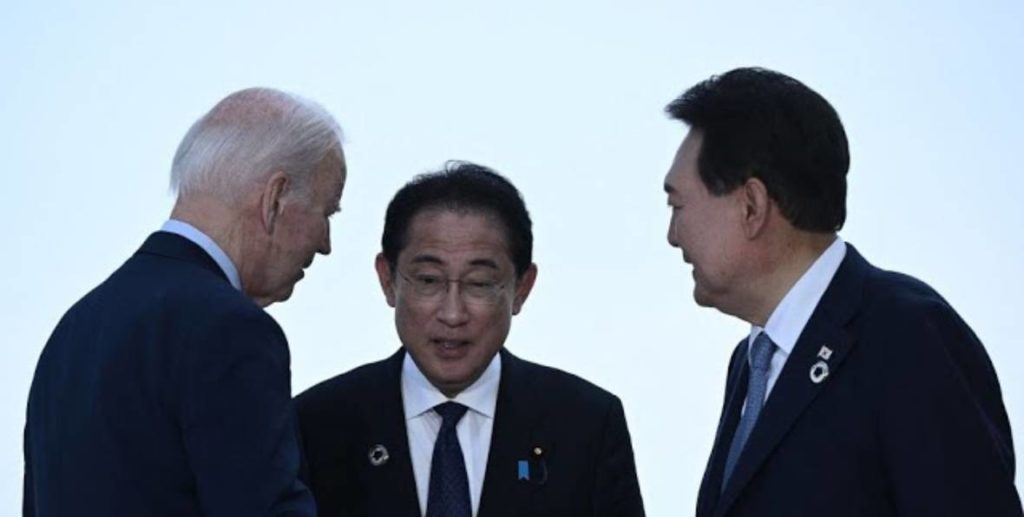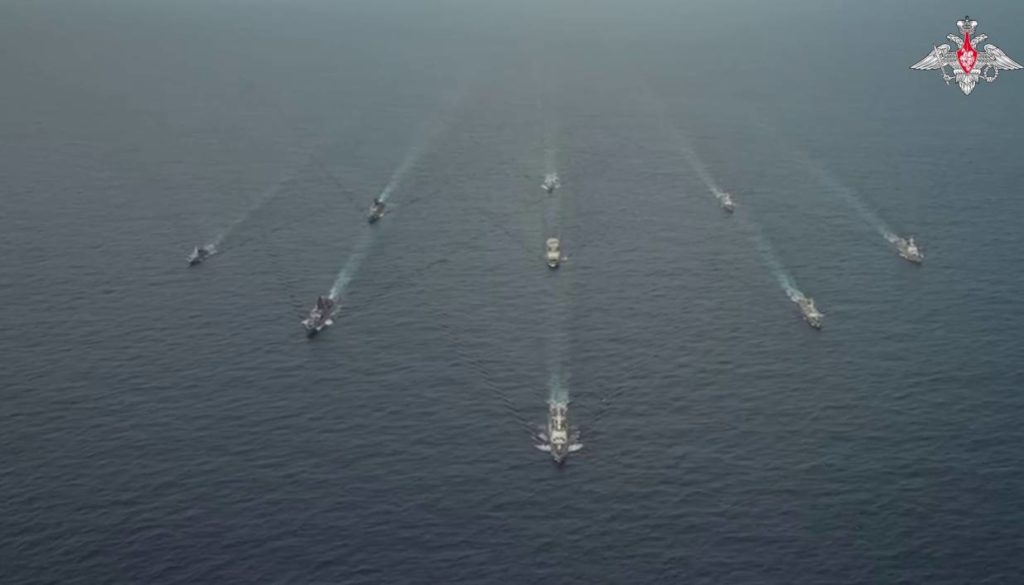NATO has shown itself to be rather rigid with respect to the conflict in Ukraine, so something more flexible may be tried in Asia
The strategy of containing China and confronting Russia are undoubtedly the two most pressing items on the West’s political agenda. In this regard, the USA and its natural ally the United Kingdom are actively searching for ways and means to implement their agenda in these areas.
First and foremost, it is about geopolitical means – the creation of alliances and blocs in the Asia-Pacific region (APR). These blocs are aimed at curbing China’s interests, particularly to fully unite with Taiwan, and creating a counterweight to the natural strategic partnership between Russia, China and North Korea. The latter has close ties with China and has resumed closer cooperation with Russia after a long break.
The USA and UK have already managed to involve Australia in the trilateral military bloc AUKUS and partly India in the Quadrilateral Security Dialogue (QUAD), which includes (in addition to the USA) Japan and Australia, to protect their interests in the region. Now they begun to involve South Korea in strategic cooperation as well.
On August 18, US President Joe Biden’s residence in Camp David, Maryland, hosted a landmark meeting between the US president and Japanese Prime Minister Fumio Kishida and South Korean President Yoon Seok-yeol. The parties discussed strategic and regular partnerships between the countries in the areas of security, technology – and, of course, containment of Russia, China and North Korea.
It is worth discussing whether the expectations from this meeting corresponded to the actual results, considering the possible prospects for the expansion of Western blocs hostile to Russia in the Asia-Pacific region, as well as how the Ukraine factor is being used to draw countries into the orbit of Western interests.
Expectations, forecasts and assumptions
On August 14, the US Center for Strategic and International Studies (CSIS) brought together a number of prominent experts to assess US capabilities and plans for the upcoming meeting at Camp David.
Victor Cha, CSIS Senior Vice President for Asia and Korea Chair, spoke very resolutely and eloquently about the use of the Ukrainian factor and almost literally proposed the topic of fear-mongering.
“There is nothing like an actual, real war, even though it’s in another part of the world, to completely change the way or affect the way leaders think about their own security,” he said.
By his logic, full-fledged military action in Ukraine leads to “reducing the gap between the Euro-Atlantic and Indo-Pacific theaters” and Indo-Pacific leaders begin to “to think – to prioritize national security over other issues” that prevented their involvement in a global strategic conflict.
The expert noted that for more than 60 years, the USA has concidered the issue of trilateral cooperation with Japan and South Korea as a “strategic hole” – primarily because of the position of Korea, which had historical contradictions with Japan. The latter annexed unified Korea in the early 20th century and maintained control over it until the end of World War II in 1945.
Cha paid tribute to the efforts of South Korean President Yoon, which made possible the dialog on South Korea’s rapprochement with Japan, and noted that South Korea’s potential to “deter credibly on the Korean Peninsula against opportunistic aggression” in case of a probable military conflict in the Taiwan Strait is a very attractive opportunity for both the USA and Japan. In turn, seven US military bases in Japan will strengthen South Korea’s rear in the confrontation with North Korea and China, the expert said.
At the same time, the political scientist said that he does not expect too much from the August 18 meeting, such as the creation of an analog of NATO in the region, but expects that it will be a prologue to a strategic trilateral dialog, and the parties will come close to understanding the need to create a new alliance.
For her part, CSIS Deputy Director and Senior Fellow Ellen Kim said that such a “trilateral alliance” has great technological potential, especially in the development of the semiconductor industry and, most significantly, the production of equipment for the manufacture of microchips and electronic equipment.
Naturally, given the increasing role of mass use of UAVs and precision weapons, which do not do without electronics, this area also has an obvious military dimension.
However, the expert noted that Japan and South Korea have different situations here as well: while Japan is willingly following the US policy of expanding bans on the export of critical positions in the semiconductor industry to China and other countries, South Korea has serious investment positions in China itself, so it is not ready to sharply increase economic confrontation with China.
One way or another, on August 15, the anniversary of the liberation of the Korean Peninsula from Japanese occupation, the South Korean president made a landmark statement aimed at abandoning all claims and historical memory.
“Korea and Japan are now partners who share universal values and pursue common interests. The Republic of Korea and Japan are partners in security and economic cooperation. As partners that cooperate on security and the economy, Korea and Japan will be able to jointly contribute to peace and prosperity across the globe while collaborating and exchanging in a future-oriented manner,” President Yoon said.
The South Korean President also called on the USA and Japan to unite against the North Korean threat and to begin closer cooperation in intelligence sharing and the use of joint intelligence assets.
Japan made another landmark episode in this regard. A recent street video survey of residents published on the anniversary of the nuclear bombings of Hiroshima and Nagasaki (August 6 and 9) found many Japanese who approved of the US nuclear strikes. So this gesture, which was made public just before the Camp David meeting, can also be considered a kind of element of trilateral reconciliation in the spirit of “no matter what.”
Camp David meeting

Video excerpt from the CSIS website, csis.org
The meeting was held on August 18. The participants named the key points that were reached during the negotiations. Expectedly, much attention was paid to the military aspect of cooperation, as well as to the confrontation with Russia. In particular, the countries declared their readiness to impose coordinated sanctions against Russia and reduce dependence on its energy resources, as well as to conduct large trilateral military exercises on land, at sea and in the air – annually.
Japan, the United States and South Korea also agreed to establish trilateral contacts at the level of the countries’ leaders, foreign ministers and defense ministers at least once a year, as well as to increase cooperation in science and technology through cooperation between national laboratories.
The leaders also agreed to build dense relations in the field of space security (i.e., primarily the development of space-based reconnaissance and surveillance assets), and to establish a trilateral working group to strengthen cooperation, “to counter DPRK illicit revenue generation and malicious cyber activities.”
In addition, just before the meeting, US Secretary of State Antony Blinken said that the USA was ready to resume dialog with North Korea without preconditions, but Blinken named nuclear disarmament on the Korean Peninsula as a topic for dialog, i.e. he actually denied North Korea the right to put forward conditions for dialog, given that the USA intends to disarm it.
In turn, the Japanese Foreign Ministry in an official statement noted that the United States and Japan during the bilateral meeting between Biden and Kishida, held in Camp David on August 18, agreed to open a program to create an interceptor for hypersonic missiles being developed in Russia, China and North Korea. A few days earlier, the Japanese publication Yomiuri reported that the program could be designed for the next 10 years.
The Chinese edition of the South China Morning Post, citing unnamed informed sources, reported on August 18 that the main part of the agenda of the trilateral meeting was devoted to countering Russia, China and North Korea.
In other words, as experts predicted, the meeting did not result in the creation of another military-political bloc in the Asia-Pacific region, but created a solid bid for further rapprochement between the countries, primarily in the military-technical sphere.
Reaction of China and Russia
China met the Camp David summit with condemnation, accusing participants of trying to ensure their own security at the expense of other countries.
“No country should seek its own security at the expense of other countries’ security interests and regional peace and stability. The international community has its fair judgment on who is stoking conflicts and exacerbating tensions. The Asia-Pacific is an anchor for peace and development and a promising land for cooperation and growth, and should never be turned into a wrestling ground for geopolitical competition again,” Foreign Ministry Spokesperson Wang Wenbin said during his press conference on August 18.
He noted that the APR states would not support attempts to import “bloc confrontation and military blocs” into the region, and would view them with vigilance and opposition.
At the same time, Russia did not comment on the Camp David meeting at the official level, despite the fact that the participants of the summit in the United States directly voiced their intention to strengthen and coordinate anti-Russian sanctions.
On August 19, in a wide-ranging interview with the Mezhdunarodnaya Zhizn magazine, Russian Foreign Minister Sergey Lavrov, after paying much attention to the problem of global confrontation between the strategic alliance between Russia and China and the United States and its satellites, as well as the unfairness of the principles of international development taken as a basis by Western countries, did not specifically address the Camp David summit held the previous day.

A still from the Russian Defense Ministry’s Telegram channel, @mod_russia
Nevertheless, on August 17, a significant group of ships, which included six Chinese and five Russian warships, including missile destroyers, passed between the Japanese islands of Okinawa and Miyako as part of a joint exercise before departing toward the East China Sea. It was the first passing for the joint group of Russian and Chinese ships.
Therefore, it is impossible to say that Russia completely ignored the fact of the trilateral meeting in the United States.
Will be a new NATO created in the Asia-Pacific?
Although several publications, including Russian ones, have already dubbed the Camp David meeting a prologue to the creation of a new analog of NATO in the Asia-Pacific region, experts are generally more restrained.
In particular, the already mentioned alliances, such as QUAD and AUKUS, declared significantly more ambitious goals. At the same time, QUAD, according to official representatives of India, which participates in this alliance, is broader than a simple military alliance.
The principles officially announced at Camp David are not yet a comprehensive military agreement on common security compared to the NATO format.
However, creating a new NATO in the region might not be the goal.
Against the backdrop of the conflict in Ukraine, NATO’s peculiar “flaw” has vividly manifested itself. The fact is that the principle of collective security forces all member states to intervene in military actions against any member of the alliance. There is also a serious problem with prompt decision-making on a number of issues, such as the inclusion of new member states in the alliance. Such key issues require the full unanimity of all NATO members, which becomes more and more difficult to achieve.
Moreover, from a military point of view, the involvement of significant and high-tech forces in a conflict at once significantly increases the risk of using nuclear weapons, which – so far – no one is clearly eager to do.
In this sense, a network of limited alliances, such as those listed above, may be preferable for the United States, which, since the 2000s, moved to intervention and creating conflicts in various parts of the world. Moreover, several overlapping alliances with obvious contradictions among members will always possess tensions – and thus the possibility of pressure and means of governing individual countries.
Source: Rossa Primavera News Agency




